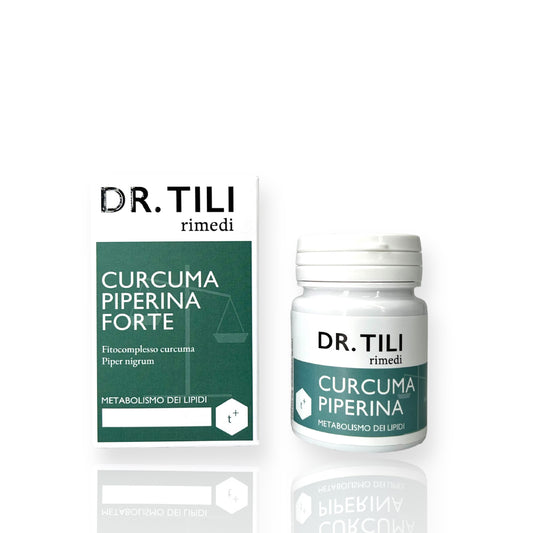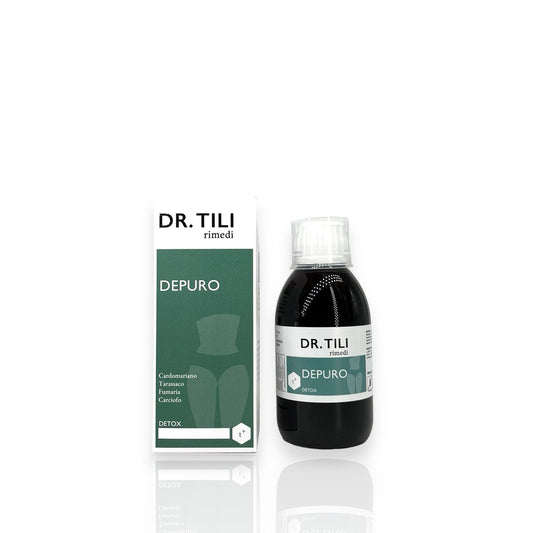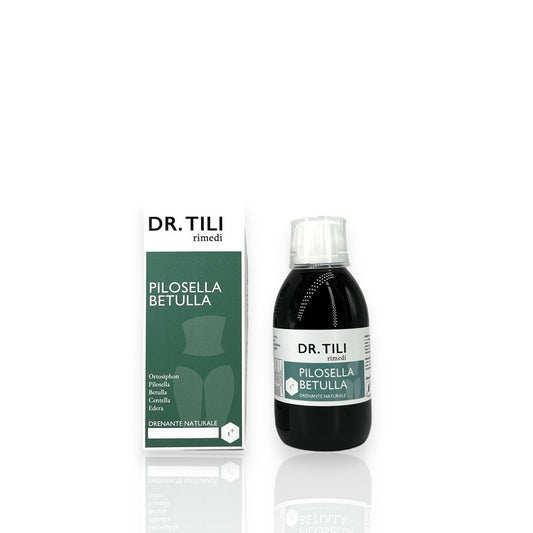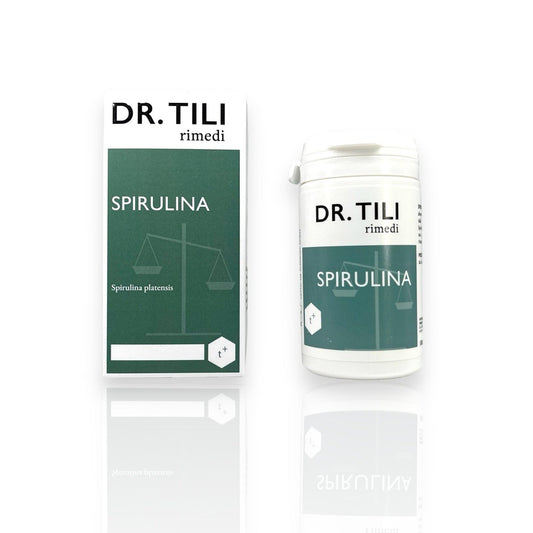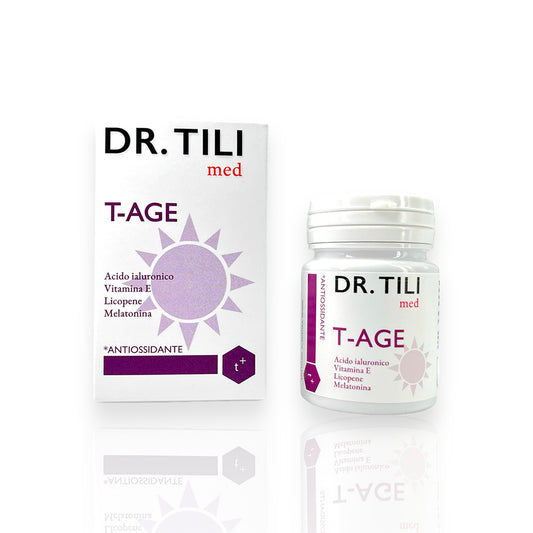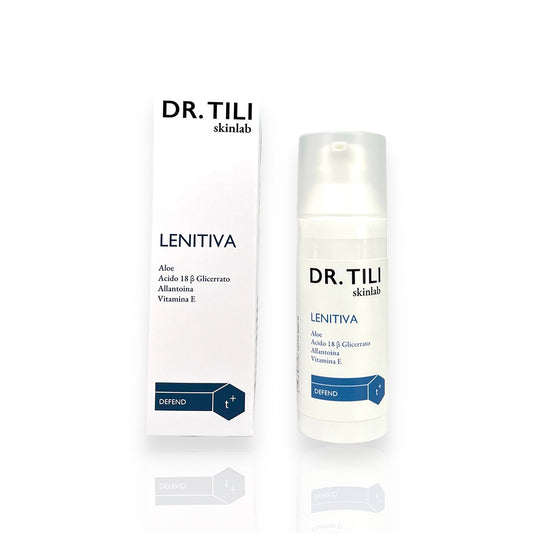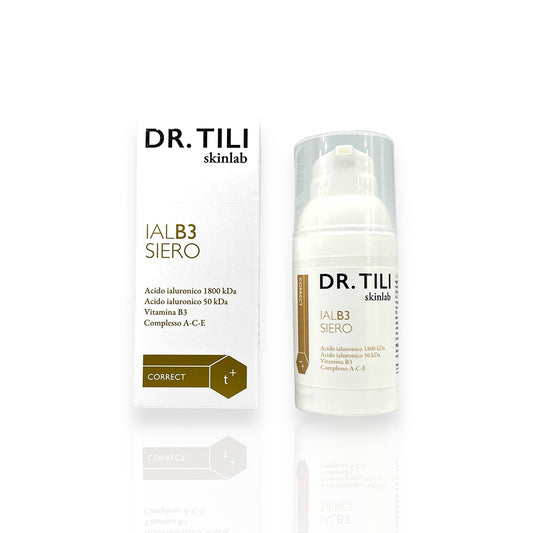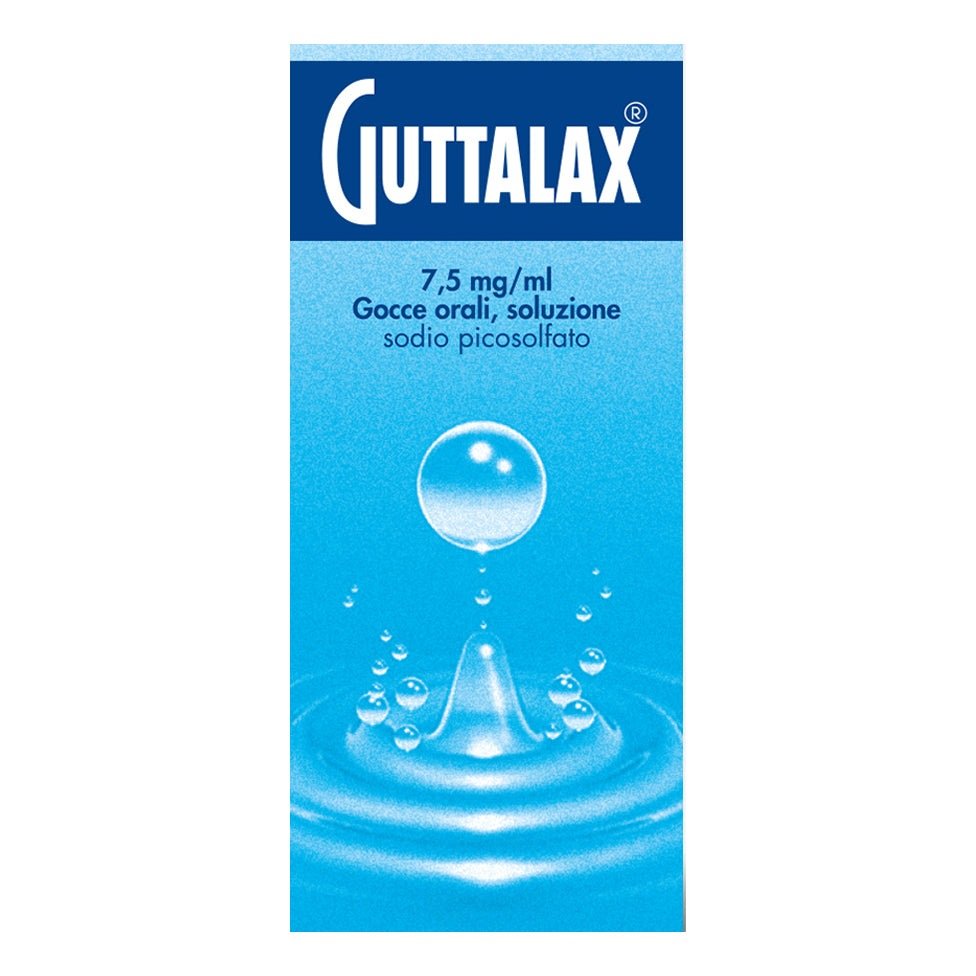OPELLA HEALTHCARE ITALY Srl
Guttalax 7.5mg/ml oral drops 15ml
Guttalax 7.5mg/ml oral drops 15ml

Pickup available at Farmacia Tili
Usually ready in 24 hours
PRODUCT NET WEIGHT
PRODUCT NET WEIGHT
EAN
EAN
020949020
MINSAN
MINSAN
020949020
Guttalax 7.5mg/ml oral drops 15ml is a laxative indicated for the short-term treatment of occasional constipation . The active ingredient, sodium picosulfate , works by stimulating intestinal motility, thus facilitating evacuation. The formulation in oral drops allows for personalized dosing and easy administration. Each ml of solution contains 7.5 mg of sodium picosulfate, ensuring an effective laxative action. Guttalax is particularly useful for those seeking a quick and targeted remedy to relieve the symptoms of constipation. The presence of sorbitol as an excipient helps improve the tolerability of the product.
ACTIVE INGREDIENTS
Active ingredients contained in Guttalax 7.5mg/ml oral drops 15ml - What is the active ingredient of Guttalax 7.5mg/ml oral drops 15ml?
1 ml (15 drops) of solution contains: Active ingredient: sodium picosulfate 7.5 mg. Excipient with known effect: Sorbitol (E420) 450 mg (see section 4.4). For the full list of excipients, see section 6.1.
EXCIPIENTS
Composition of Guttalax 7.5mg/ml oral drops 15ml - What does Guttalax 7.5mg/ml oral drops 15ml contain?
Sodium benzoate, liquid sorbitol (E420), sodium citrate, citric acid monohydrate, purified water.
DIRECTIONS
Therapeutic indications Guttalax 7.5mg/ml oral drops 15ml - Why is Guttalax 7.5mg/ml oral drops 15ml used? What is it used for?
Short-term treatment of occasional constipation.
CONTRAINDICATIONS SIDE EFFECTS
Contraindications Guttalax 7.5mg/ml oral drops 15ml - When should Guttalax 7.5mg/ml oral drops 15ml not be used?
Guttalax is contraindicated in patients with: • Hypersensitivity to the active substance and to any of the excipients listed in section 6.1; • Paralytic ileus or intestinal or biliary tract obstruction or stenosis; • Severe acute painful and/or febrile abdominal conditions (such as appendicitis) associated with nausea and vomiting; • Severe dehydration; • Rare hereditary conditions of incompatibility with one of the excipients (see section 4.4). • Nausea or vomiting; • Acute inflammation of the gastrointestinal tract; • Rectal bleeding of unknown origin; • Gallstones; • Hepatic insufficiency; • Pregnancy and breast-feeding (see section 4.6). Do not administer to children under 3 years of age (see section 4.4).
DOSAGE
Quantity and method of taking Guttalax 7.5mg/ml oral drops 15ml - How to take Guttalax 7.5mg/ml oral drops 15ml?
The following dosages are recommended: Adults In adults, it is recommended to start with 7-8 drops in water per day and decrease if the effect is excessive or increase if the laxative effect is not achieved. In cases of obstinate constipation, up to 15-20 drops in water can be used. Paediatric population In children (over 3 years): 2-3 drops in water per day. Do not exceed the recommended doses. It is advisable to initially use the minimum recommended doses. The correct dose is the minimum sufficient to produce easy evacuation of soft stools. When necessary, the dose can then be increased, but without ever exceeding the maximum indicated. Guttalax should preferably be taken in the evening to induce evacuation the following morning. Swallow together with an adequate quantity of water. A diet rich in liquids promotes the effect of the medicine. Laxatives should be used as infrequently as possible and for no more than seven days. Use for longer periods of time requires a doctor's prescription after adequate evaluation of the individual case.
CONSERVATION
Storage Guttalax 7.5mg/ml oral drops 15ml - How to store Guttalax 7.5mg/ml oral drops 15ml?
Keep the bottle in the outer carton in order to protect from light. Shelf life after first opening: 12 months.
WARNINGS
Warnings Guttalax 7.5mg/ml oral drops 15ml - About Guttalax 7.5mg/ml oral drops 15ml it is important to know that:
Warnings Like all laxatives, Guttalax should not be taken continuously every day or for long periods of time without investigating the cause of constipation. Prolonged and excessive use may lead to diarrhea, electrolyte imbalance and hypokalemia. Cases of dizziness and/or syncope have been reported in patients who have taken Guttalax. The data available on these cases suggest that the events could be related to defecation syncope (or syncope attributable to the evacuation effort), or to a vasovagal response to abdominal pain related to constipation, and not necessarily to the intake of sodium picosulfate itself. Laxative abuse (frequent or prolonged use or with excessive doses) can cause persistent diarrhea with consequent loss of water, mineral salts (especially potassium) and other essential nutrients. In the most serious cases, dehydration or hypokalemia may occur, which may cause cardiac or neuromuscular dysfunction, especially in the case of simultaneous treatment with cardiac glycosides, diuretics or corticosteroids. The abuse of laxatives, especially contact laxatives (stimulant laxatives), may cause dependence (and, therefore, the possible need to gradually increase the dosage), chronic constipation and loss of normal intestinal functions (intestinal atony). Precautions for use In children aged between 3 and 12 years, the medicine can be used only after consulting your doctor. The treatment of chronic or recurrent constipation always requires medical intervention for diagnosis, prescription of drugs and monitoring during therapy. Consult your doctor when the need for the laxative arises from a sudden change in previous intestinal habits (frequency and characteristics of evacuations) that lasts for more than two weeks or when the use of the laxative fails to produce effects. It is also advisable for elderly or unhealthy subjects to consult their doctor before using the medicine. This medicinal product contains 450 mg of sorbitol in 1 ml (15 drops), equivalent to 600 mg of sorbitol in the maximum recommended daily dose of 1.33 ml (20 drops) in the treatment of an adult patient. Sorbitol is a source of fructose. Patients with hereditary fructose intolerance (HFI), a rare genetic disorder, should not be given this medicine. This medicinal product contains less than 1 mmol sodium (23 mg) in 20 drops, the maximum recommended daily dose for an adult, i.e. it is essentially “sodium-free”.
INTERACTIONS
Interactions Guttalax 7.5mg/ml oral drops 15ml - Which medicines or foods can modify the effect of Guttalax 7.5mg/ml oral drops 15ml?
Laxatives may reduce the residence time in the intestine, and therefore the absorption, of other drugs administered orally at the same time. Therefore, avoid taking laxatives and other drugs at the same time: after taking a medicine, leave an interval of at least 2 hours before taking the laxative. Milk or antacids may modify the effect of the medicine; leave an interval of at least one hour before taking the laxative. Continued use of Guttalax may increase the response of patients to oral anticoagulants and alter glucose tolerance. Concomitant intake of diuretics or adrenocorticosteroids and excessive doses of Guttalax may lead to an increased risk of electrolyte imbalance. This imbalance, in turn, may lead to increased sensitivity to cardiac glycosides. Concomitant administration of antibiotics may reduce the laxative effect of Guttalax.
SIDE EFFECTS
Like all medicines, Guttalax 7.5mg/ml oral drops 15ml can cause side effects - What are the side effects of Guttalax 7.5mg/ml oral drops 15ml?
Like all medicines, Guttalax can cause side effects, although not everybody gets them. Adverse reactions are listed below by system organ class and frequency, using the following categories: Very common ≥ 1/10 Common ≥ 1/100, < 1/10 Uncommon ≥ 1/1,000, < 1/100 Rare ≥ 1/10,000, < 1/1,000 Very rare < 1/10,000 Not known Frequency cannot be estimated from the available data. Immune system disorders . Not known*: hypersensitivity. Nervous system disorders . Uncommon: dizziness; Not known*: syncope. The phenomena of dizziness and syncope that occur after taking sodium picosulfate seem to be attributable to a vasovagal response (following, for example, abdominal pain or the evacuation of stools). Gastrointestinal disorders . Very common: diarrhoea; Common: abdominal cramps, abdominal pain and abdominal discomfort; Uncommon: vomiting, nausea. Occasionally: isolated cramp-like pain or abdominal colic, more frequent in cases of severe constipation. Skin and subcutaneous tissue disorders . Not known*: skin reactions such as angioedema, drug eruption, rash, pruritus. *These adverse reactions have been observed in post-marketing experience. With a 95% probability, the frequency category is not greater than uncommon, but could be lower. A precise estimate of the frequency is not possible since these adverse reactions have not occurred in 1020 patients in clinical trials . Reporting of side effects If you get any side effects, talk to your doctor or pharmacist. This includes any possible side effects not listed in this leaflet. Side effects can also be reported directly via the national reporting system at https://www.aifa.gov.it/content/segnalazioni-reazioni-avverse. Reporting side effects helps provide more information on the safety of this medicine .
OVERDOSE
Overdose Guttalax 7.5mg/ml oral drops 15ml - What are the risks of Guttalax 7.5mg/ml oral drops 15ml in case of overdose?
Signs and symptoms Following the intake of high doses of the drug, the following may occur: watery stools (diarrhoea), abdominal cramps and a significant loss of fluids, potassium and other electrolytes. Cases of ischemia of the colonic mucosa have been reported with doses of Guttalax considerably higher than the dosage recommended for the treatment of occasional constipation. Guttalax, like other laxatives, in case of overdose causes chronic diarrhoea, abdominal pain, hypokalaemia, secondary hyperaldosteronism and kidney stones. In association with chronic abuse of laxatives, the following have also been described: renal tubular damage, metabolic alkalosis and muscle weakness secondary to hypokalaemia. See also the section “Special warnings and precautions for use” regarding the abuse of laxatives. Treatment If treatment is performed shortly after ingestion of Guttalax, absorption can be reduced or avoided by inducing vomiting or gastric lavage. Fluid and electrolyte losses must be replaced. This is especially important in the elderly and young. The administration of antispasmodics may be useful.
PREGNANCY AND BREASTFEEDING
If you are pregnant or breast-feeding, think you may be pregnant or are planning to have a baby, ask your doctor for advice before taking Guttalax 7.5mg/ml oral drops 15ml.
Fertility No studies have been conducted to evaluate the effects on human fertility. Non-clinical studies have not revealed any effect on fertility (see section 5.3). Pregnancy There are no adequate and well-controlled studies on the use of the medicinal product during pregnancy. Long-term experience has shown no evidence of undesirable or harmful effects during pregnancy. Although no toxic effects have ever been reported during pregnancy, the medicinal product should be used only in case of necessity, under the direct supervision of a doctor, after evaluating the expected benefit for the mother in relation to the possible risk for the foetus. Breastfeeding Clinical data demonstrate that neither the active fraction of sodium picosulfate, bis-(p-hydroxyphenyl)-pyridyl-2-methane (BHPM), nor the conjugated form (its glucuronic derivatives), are excreted in determinable quantities in breast milk. However, the medicinal product should be used only in case of necessity, under the direct supervision of a doctor, after evaluating the expected benefit for the mother in relation to the possible risk for the infant.
DRIVING AND USE OF MACHINERY
Taking Guttalax 7.5mg/ml oral drops 15ml before driving or using machinery - Does Guttalax 7.5mg/ml oral drops 15ml affect driving or using machinery?
Since no specific studies have been performed, no inhibitory effects of Guttalax that could impair the ability to drive and use machines are known. However, patients should be informed that due to the vasovagal response (e.g. due to abdominal spasm), dizziness and/or syncope may occur. If patients experience abdominal spasm, they should avoid potentially dangerous activities such as driving or using machines.



